What Is Cloudways? Review of Hosting, Features & Pricing
In cases where gaining expertise in or handling server configuration isn’t feasible, managed web hosting platforms like Cloudways can get web apps up and running in a few steps. Read on to learn about Cloudways’ features, pricing and challenges.
Managed web hosting platforms like Cloudways come in handy when outsourcing cloud expertise seems like the most feasible option for your organization. In addition to handling the tedious part of web hosting, Cloudways offers a rich set of features including vertical scaling, staging and cloning, server monitoring and more.
That said, using Cloudways comes with various challenges, and understanding them will help you decide whether the service is suitable for your needs. If you’re considering various managed web hosting services, keep reading to understand what Cloudways is, what resources and services are available, and how to get set up.
What Is Cloudways?
Cloudways is a managed cloud hosting platform. It offers products and solutions that take care of as much of the server management as possible while delivering the same results or better than when you handle everything yourself. For the most part, all you have to do is provide your desired specifications and application data.
Note that Cloudways does not have its own data centers. Instead, it runs on multiple cloud providers, including AWS, DigitalOcean, Linode, Google Cloud and Vultr. Although this makes it a cloud reseller, in a sense, it does more than just resell cloud resources — it configures resources to the point where you can use them for specific purposes.
Cloudways Features
You can think of Cloudways as a Platform-as-a-Service (PaaS) provider, since it offers preconfigured environments for app deployment. Of course, unlike many of the PaaS providers you may have come across, it doesn’t own the underlying infrastructure. Its features are similar, though.
Cloudways Managed Hosting
Managed services often come with a high level of abstraction, leaving you with little to no control over their operations. Although Cloudways mainly offers preconfigured versions of content management systems like WordPress and Magento, its managed hosting offers an option to run custom apps on your servers so you can maintain some level of control.
When running a custom app, you can create SSH/SFTP users, deploy your app using your preferred git repository and maintain access to an SSH terminal on your server. That said, the staging environment, database and backup are preconfigured.
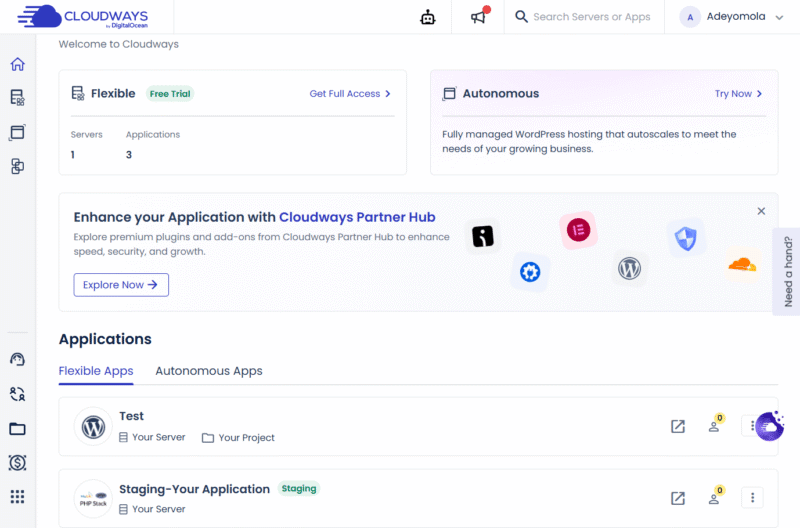
Compared to cloud providers like DigitalOcean, AWS and Azure, this managed hosting service’s custom app feature is limited. However, having fewer configurations is the point of managed hosting, so it all depends on how much control you’re willing to yield.
Cloudways Vertical Scaling
Cloudways allows you to scale up your server’s memory, CPU and storage space simply by moving sliders and choosing from a dropdown menu.
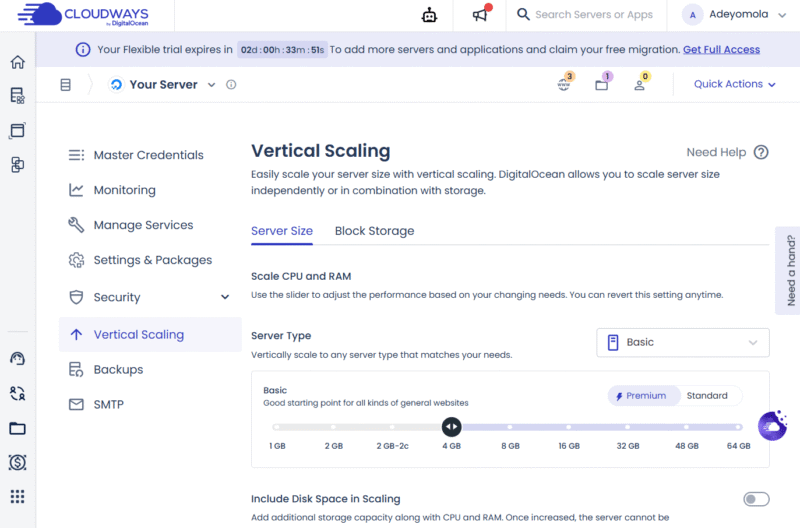
Scaling down isn’t as straightforward, though. For servers running on AWS and Google Cloud, you can seamlessly scale down CPU and memory, but you have to clone the server to downscale the storage size. For other cloud platforms (Linode, DigitalOcean and Vultr), you have to clone the server to downscale in any case.
Staging & Cloning Environment
If you’re worried about breaking your application when pushing out updates, Cloudways provides a staging environment to conduct a test run. It also allows you to clone your current application for use in the staging environment. Moreover, you can pull and push code changes between the staging application and your live application.
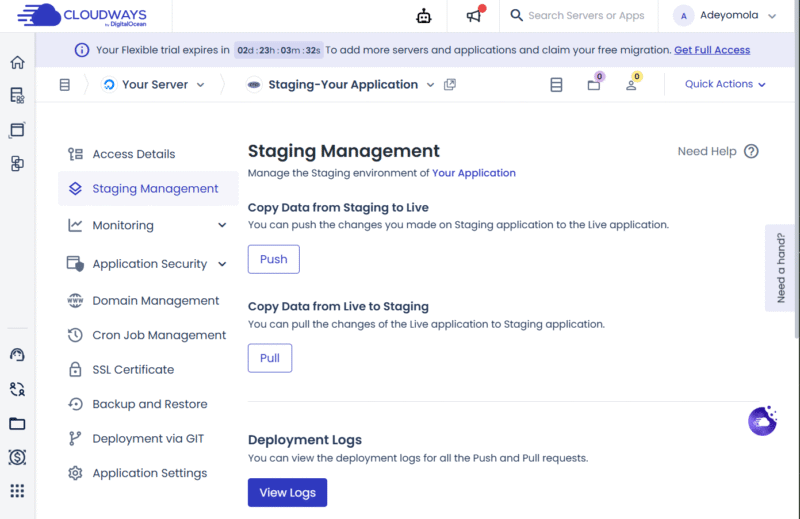
between a live application and a staging application.
The staging and cloning environments are top features for us, as they minimize the risk of downtime and ensure app stability before going live.
Cloudways Server Monitoring
Cloudways monitors servers by measuring general disk, CPU, bandwidth and memory usage, as well as cache database performance and the number of I/O operations, database connections and auto-healing restarts.
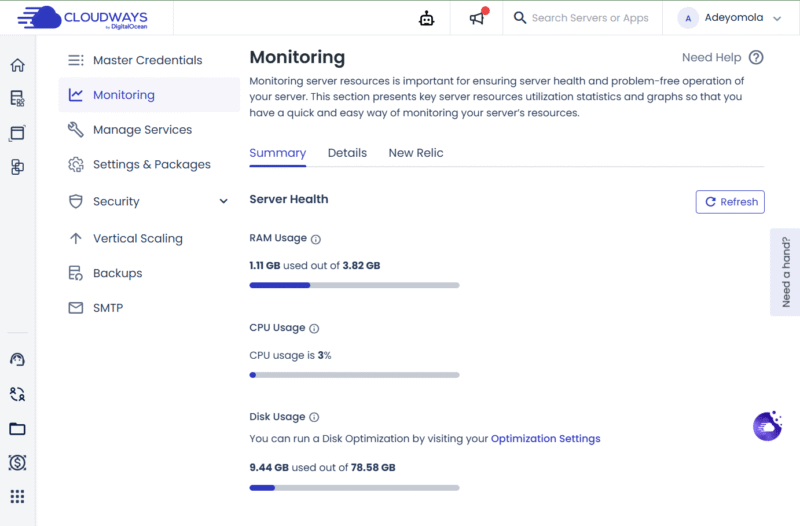
and a details tab for in-depth analysis.
It doesn’t offer usage data for specific processes except for a few related to the app. That said, the metrics it does provide are more than enough in most situations.
Cloudways monitoring not only observes your server but also keeps an eye on your application. Application monitoring involves fairly comprehensive traffic analytics, such as IP requests, bot traffic, URL requests, bandwidth and status codes. In addition, you can view PHP metrics, cron job resource usage, app file disk usage, access logs and error logs.
SMTP Integration
Cloudways’ SMTP integration allows you to configure an outgoing email service in a few steps. It supports various email servers, including Elastic Email, Mailgun, SendGrid and AuthSMTP.
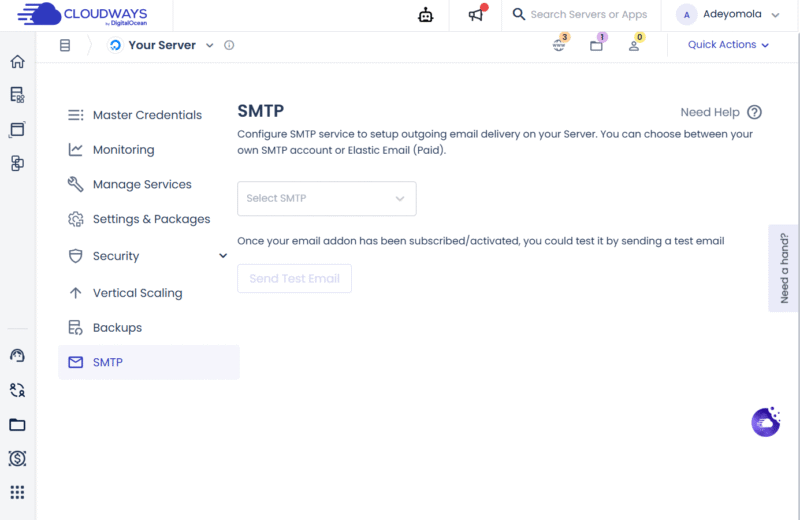
You can also use an SMTP server that isn’t pre-integrated as long as you can provide its hostname, the port and your email credentials. Once it’s set up, you can test it out with a single click.
CDN Integration
Cloudways has a ready-to-go Cloudflare integration, which you’ll find in your application’s dashboard. The CDN integration offers access to more than 200 edge locations but requires a subscription to the Cloudways Flexible plan. In addition to functioning as a CDN, Cloudways’ Cloudflare integration helps with application security and content optimization.
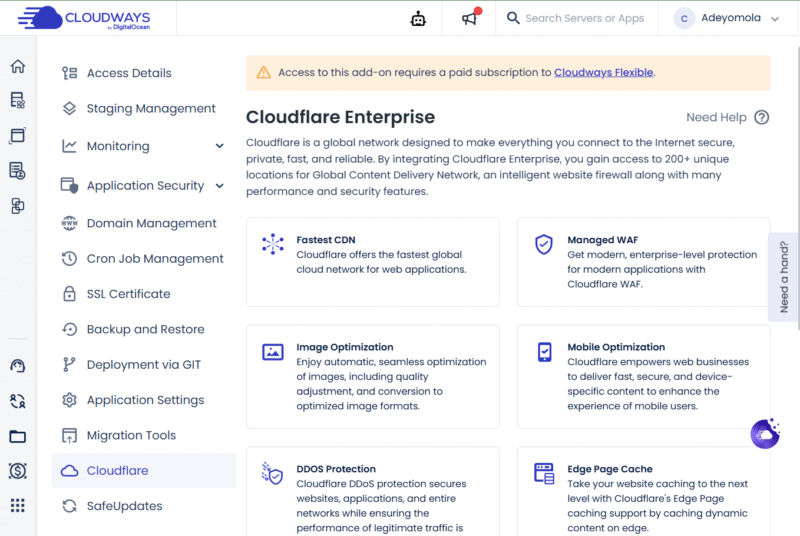
Security Features
There are various security features in Cloudways, including those that come with the CDN integration mentioned previously. At the app and server level, you have access to an incidents dashboard that shows you any suspicious activity. This dashboard is updated every minute, so you can detect issues in near real time.
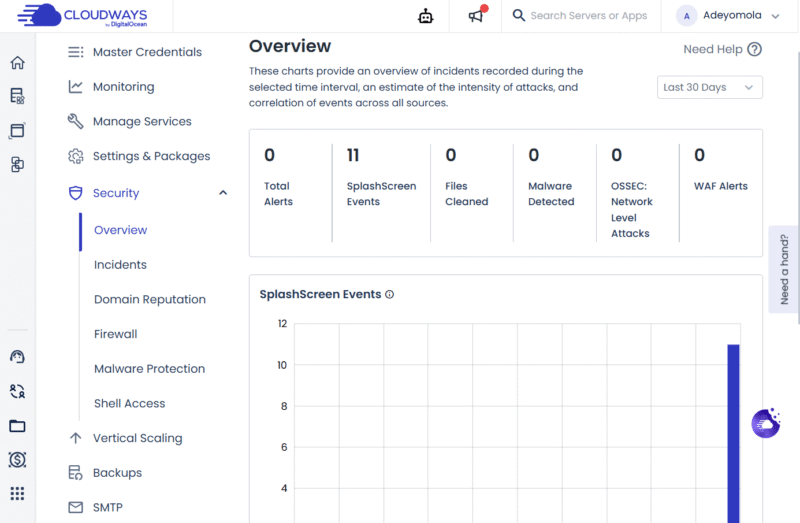
In addition to the incidents dashboard, you have optional paid malware protection at the app level, which cleans files and databases, and blocks phishing and malware injection. Furthermore, you get free SSL certificates through Let’s Encrypt that you can readily manage yourself.
At the server and database level, you can control shell access by allowlisting authorized IP addresses. For comprehensive control over incoming traffic, Cloudways has dedicated firewalls for allowlisting and blocklisting IPs and countries. Furthermore, you can add a time to live (TTL) to temporarily allowlist and blocklist IP addresses.
Cloudways Benefits
When it comes to cloud deployments, Cloudways does the most exhausting work for you. The fact that it can scale to varying degrees makes it suitable for professionals and non-professionals alike. It also offers affordable pricing, detailed guides and accessible support.
- Serves people of various skill levels: Since it supports both custom applications and preconfigured content management systems, Cloudways is suitable for both IT professionals and non-technical people.
- Detailed guide: Cloudways has a stacked blog that serves as a knowledgebase for troubleshooting, setting up your environment and accessing general information about the Cloudways platform. In many cases, you’ll find an answer in one of those articles and won’t have to contact the support team.
- Accessible support: Cloudways offers support through live chats, tickets, email and scheduled calls, and you can easily access support agents through these channels. However, the experience with support agents varies — some are less capable than others.
- Affordable pricing: You’ll typically pay less when you use Cloudways on providers like DigitalOcean, Vultr and Linode as opposed to hyperscalers (AWS and Google Cloud).
- Easy to learn: Considering it can help you deploy a website in a few clicks, Cloudways is easy to learn and use. The guides, accessible support and community contribute to the ease of learning.
Cloudways Challenges
Although it offers a mostly positive experience, Cloudways is not without challenges, such as authentication issues and delayed resolutions.
- Variable support quality: Although the support queue is readily available, you may experience a difference in technical expertise with some agents compared to others.
- Unexpected charges: While not very common, Cloudways has occasionally added incorrect charges to customers’ bills. The company provided a resolution only after the customers contacted support multiple times.
- OTP delays: Recently, Cloudways experienced an issue where one-time passcodes (OTPs) arrived late or not at all. This left customers unable to access their accounts, underlining potential issues with the reliability of Cloudways’ email two-factor authentication (2FA). That said, other 2FA options are available, including authenticator apps and SMS OTPs, which you can use together.
Cloudways Pricing
Running low-intensity workloads on Cloudways is cheaper than on WordPress site hosting platforms like Kinsta and WPEngine, especially when you’re running on Linode, Vultr or DigitalOcean. However, Bluehost and Hostinger are typically cheaper for these types of workloads.
Cloudways offers two types of hosting: Cloudways Flexible and Cloudways Autonomous, both of which are pay-as-you-go.
With Cloudways Flexible, resources have hourly rates, and you get a monthly bill.
| Cloudways Flexible: Third-Party Cloud Provider | Server Type & Price Range Per Month (28 Days) |
|---|---|
| DigitalOcean | Basic: $14-$487 General Purpose: $106-$2,369 CPU Optimized: $164-$1,739 |
| AWS | Standard: $20.56-$3,568.98 Compute Optimized: $164.50-$3,189.82 |
| Vultr | Standard: $14-$764 High Frequency: $16-$405 |
| Linode | Standard: $14-$1,253 General Purpose: $69-$2,480 Medium: $89-$3,127 |
| Google Cloud | Standard: $37.33-$1,290.30 Compute Optimized: $255.37-$2,454.55 High Compute: $89.37-$1,850.50 |
Cloudways Autonomous has monthly rates that are prorated hourly. If you stop using the service partway through the month, you pay only through the last used hour.
| Cloudways Autonomous Plan | Price (Per Month) |
|---|---|
| Plan 1 | $35 |
| Plan 2 | $90 |
| Plan 3 | $145 |
| Plan 4 | $240 |
| Plan 5 | $555 |
| Plan 6 | $955 |
| Plan 7 | $1,640 |
Linode, DigitalOcean and Vultr charge similar rates on Cloudways Flexible and are generally less expensive than Google Cloud and AWS. That said, stopped servers on Linode, Vultr and DigitalOcean are billed as if they were still active, while those on AWS and Google Cloud Platform incur charges only for storage space when inactive.
How to Use Cloudways
To use Cloudways, follow these steps, starting with the signup process.
- Sign Up for Cloudways
To sign up for Cloudways, go to the Cloudways website and click on “start free.” On the next page, choose one of the single sign-on (SSO) options or enter your details manually, then verify your email and phone number to complete the signup.
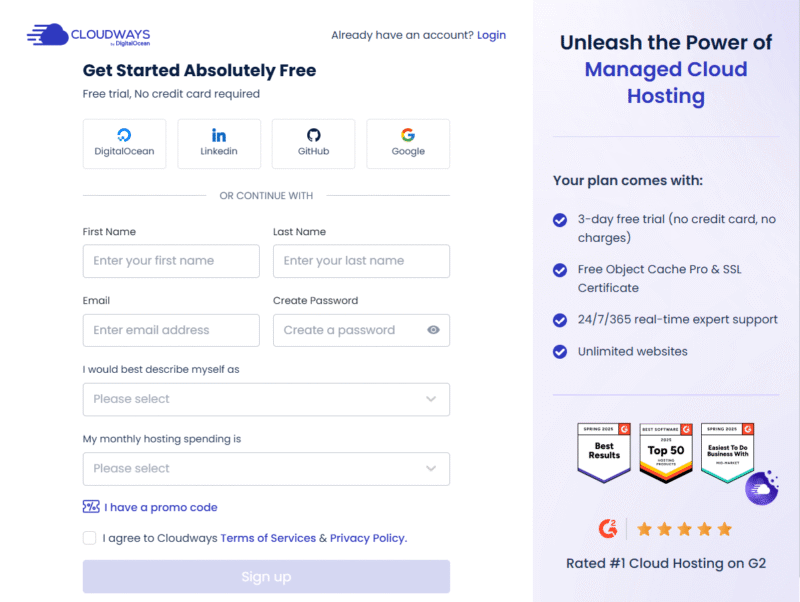
- Create a Server and Deploy Your Application
On the Cloudways console homepage, scroll down and click “add application” to create a server and deploy your application.
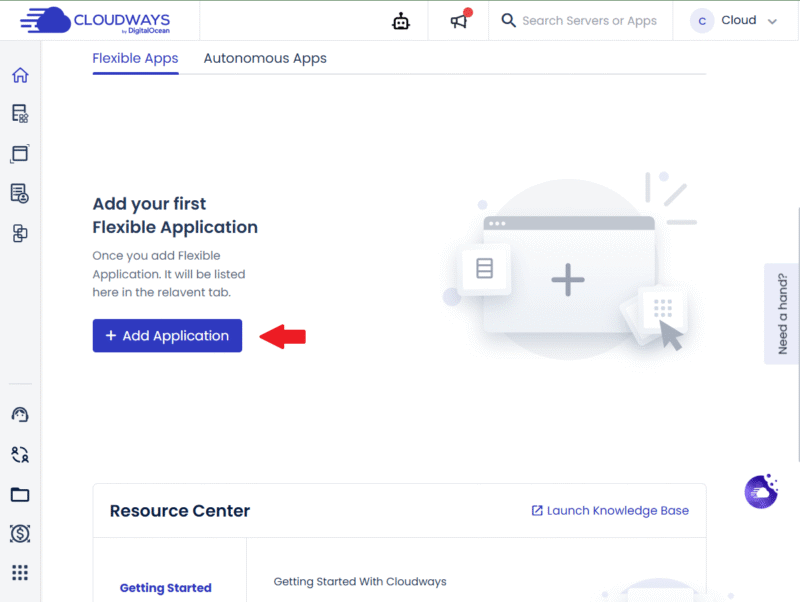
- Configure and Launch Your Server and Application
After clicking on “add application,” you’ll be redirected to configure your server and application. On the configuration page, you can choose your preferred third-party cloud provider, server type, server location, server size and application deployment. You can also name your server, application and project on this page. When everything’s all set, click on “launch now” to complete the deployment.
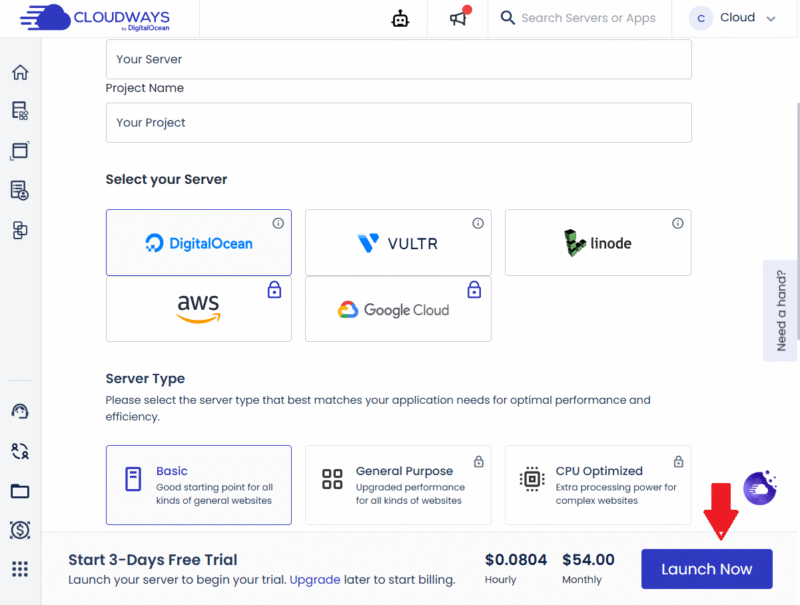
Cloudways Customer Support
You can reach Cloudways customer support through live chat and support tickets when logged in to your account. If you do not have an account, you can reach support via email or schedule a call through the support webform.
For most of its history, Cloudways support has been readily accessible to most users. However, there are recent cases of people waiting many days to get a response or resolution. Still, the overall verdict is that support is accessible.
Cloudways vs Competing Cloud Providers
Cloudways competes with cloud hosting providers like Rackspace, Hostinger, Bluehost, WPEngine, Kinsta, Flywheel and SiteGround. Let’s see how it compares to some of these options.
Cloudways vs Rackspace
While Cloudways and Rackspace both offer managed cloud services, Rackspace’s service model focuses on offering on-demand access to IT professionals, particularly at the enterprise level. Rackspace also has its own infrastructure (aside from the other cloud providers it uses), unlike Cloudways.
Cloudways vs Bluehost
Cloudways offers a layer of solutions built on public cloud providers like AWS and Vultr, while Bluehost runs on its own cloud servers. With Cloudways, you can expect better performance because it uses the server resources of hyperscalers like AWS and Google Cloud.
That said, you get a free domain and email hosting with Bluehost, which are available only as add-ons on Cloudways. Cloudways typically is cheaper in the long run, though.
Cloudways vs Hostinger
Compared to Hostinger, Cloudways has higher scalability, thanks to the fact that it runs on top cloud providers like AWS and Google Cloud. Interestingly, even though Cloudways is a managed service provider, it is less abstracted than Hostinger. Hostinger is more beginner-friendly, though.
Final Thoughts: Cloudways Hosting
With Cloudways, you can deploy and host websites in just a few clicks. Unlike many top web hosting providers, it gives you a bit of control over the servers and has a high degree of scalability. However, recent hiccups in its customer support responsiveness and expected billing will shed an unfavorable light on the service if they persist.
Have you ever used Cloudways? If so, which of the supported cloud providers offered you the best performance? Based on your experience, would you rather run your workloads directly on the underlying cloud providers or stick with Cloudways? Share your thoughts with us in the comments. As always, thank you for reading.
FAQ: Cloudways Managed Cloud Hosting
No, Cloudways is not necessarily better than GoDaddy, as their ideal use cases differ. Cloudways is great for resource-intensive workloads and offers more control, whereas GoDaddy is perfect for smaller workloads where a high level of abstraction isn’t a problem.
Cloudways builds web hosting solutions on top of infrastructure from Infrastructure-as-a-Service (IaaS) providers like AWS, DigitalOcean and Google Cloud. DigitalOcean, on the other hand, offers users the infrastructure to build solutions themselves.
Cloudways is a managed web hosting platform. It also hosts managed databases.
Yes, Cloudways is generally considered a good host. It serves both developers and non-developers, offers a detailed knowledgebase and is affordable.


